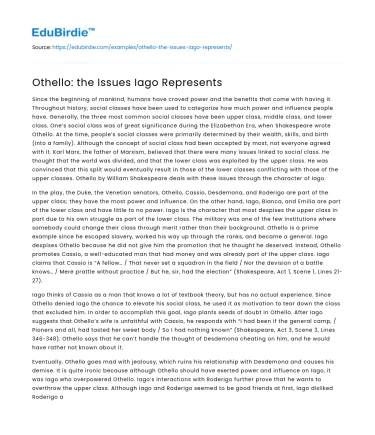Since the beginning of mankind, humans have craved power and the benefits that come with having it. Throughout history, social classes have been used to categorize how much power and influence people have. Generally, the three most common social classes have been upper class, middle class, and lower class. One’s social class was of great significance during the Elizabethan Era, when Shakespeare wrote Othello. At the time, people’s social classes were primarily determined by their wealth, skills, and birth (into a family). Although the concept of social class had been accepted by most, not everyone agreed with it. Karl Marx, the father of Marxism, believed that there were many issues linked to social class. He thought that the world was divided, and that the lower class was exploited by the upper class. He was convinced that this split would eventually result in those of the lower classes conflicting with those of the upper classes. Othello by William Shakespeare deals with these issues through the character of Iago.
In the play, the Duke, the Venetian senators, Othello, Cassio, Desdemona, and Roderigo are part of the upper class; they have the most power and influence. On the other hand, Iago, Bianca, and Emilia are part of the lower class and have little to no power. Iago is the character that most despises the upper class in part due to his own struggle as part of the lower class. The military was one of the few institutions where somebody could change their class through merit rather than their background. Othello is a prime example since he escaped slavery, worked his way up through the ranks, and became a general. Iago despises Othello because he did not give him the promotion that he thought he deserved. Instead, Othello promotes Cassio, a well-educated man that had money and was already part of the upper class. Iago claims that Cassio is “A fellow… / That never set a squadron in the field / Nor the devision of a battle knows… / Mere prattle without practice / But he, sir, had the election” (Shakespeare, Act 1, Scene 1, Lines 21-27).
Save your time!
We can take care of your essay
- Proper editing and formatting
- Free revision, title page, and bibliography
- Flexible prices and money-back guarantee
Iago thinks of Cassio as a man that knows a lot of textbook theory, but has no actual experience. Since Othello denied Iago the chance to elevate his social class, he used it as motivation to tear down the class that excluded him. In order to accomplish this goal, Iago plants seeds of doubt in Othello. After Iago suggests that Othello’s wife is unfaithful with Cassio, he responds with “I had been if the general camp, / Pioners and all, had tasted her sweet body / So I had nothing known” (Shakespeare, Act 3, Scene 3, Lines 346-348). Othello says that he can’t handle the thought of Desdemona cheating on him, and he would have rather not known about it.
Eventually, Othello goes mad with jealousy, which ruins his relationship with Desdemona and causes his demise. It is quite ironic because although Othello should have exerted power and influence on Iago, it was Iago who overpowered Othello. Iago’s interactions with Roderigo further prove that he wants to overthrow the upper class. Although Iago and Roderigo seemed to be good friends at first, Iago disliked Roderigo as well. While telling Roderigo about his plan to destroy Othello, Iago frequently says “put money in thy purse” (Shakespeare, Act 1, Scene 3, Line 335). This suggests that Iago is pleased to rob Roderigo while betraying Othello at the same time. The consequences of Iago’s actions are dire since he ends up causing the deaths of Othello, Desdemona, Emilia, and Roderigo. He was the “puppet master” that ensnared everybody in his trap.
All in all, Shakespeare uses the character of Iago to illustrate the limitations of social class and power. Marx believed that in order for everybody to live happily and without conflict, social classes should be eliminated. Although that may not be possible, problems with social classes are still relevant. Looking at Othello from a Marxist lens provides insight into the lives, backgrounds, and biases of people with different levels of power at the time.






 Stuck on your essay?
Stuck on your essay?

